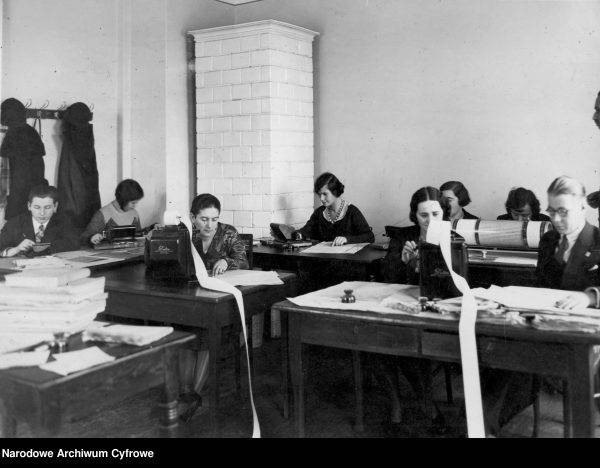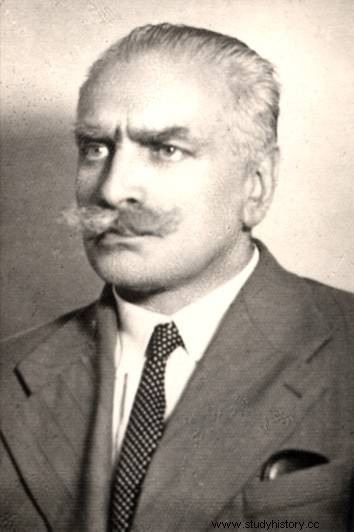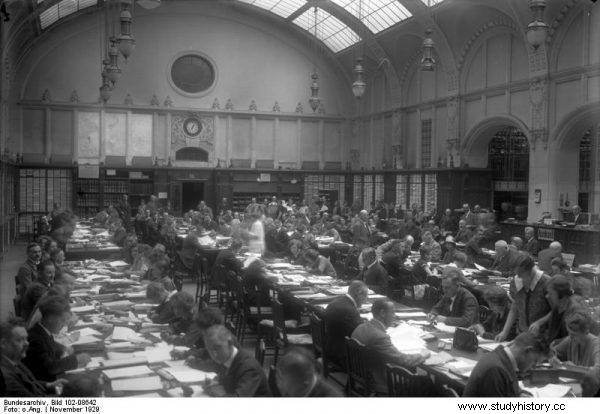They order, enforce, charge fees, tell us to describe cases and wait for a reply, which will come by post on time (or not). It is difficult to sympathize with officials, and often even difficult to understand. But it used to be much, much worse.
In the times of the Second Polish Republic it was even said that one should kneel humbly in front of the holy Bureaucrats. Remigiusz Piotrowski found numerous examples of such idolatry and included in his book "Absurdies and Curiosities of Pre-War Poland", adding that: The only advantage of bureaucracy is its absurdity. The entertainment, however, is quite peculiar, and it is usually fun for those sitting in the second row.
The overgrowth and inertia of the pre-war bureaucracy were the result of the partitions. Immediately after independence, we had 3 legal codes in use, the military spoke 4 languages, a separate administration existed in 5 regions, and there were 6 different currencies in circulation. The smallest problem seemed to be that there were 2 separate track gauges, not counting the narrow gauge lines. For the efficient functioning of the state, it was necessary to unify the law and regulations.
It was primarily the role of parliamentarians, but also of the chosen ones of the society acting in local governments. They set to work so briskly that in 1936 the Journal of Laws alone numbered 13,000. laws and regulations ! A lot of. The more that some of them still came from the partition laws, and some even from the 18th century. In addition, the clerical work was to be facilitated by entries from Monitor Polski, government dailies and 16 voivodeship dailies. The effect was predictable - old and outdated regulations were mixed with new ones, which increased the legal chaos.
The practical growth of bureaucracy was also influenced by "Poles who lived their entire lives in Russia, Prussia or Austria had different habits and could not get rid of them overnight," as noted by Norman Davies. Even the longtime interior minister Felicjan Sławoj Składkowski admitted that the work of the offices greatly irritated the public:
The very course of service in offices, the so-called amcenie [office], was, following the Austrian model, not a method of work, but an end in itself, regulated in the most convenient way for the good of the service, that is, officials. The man who paid the taxes for these offices, the businessperson who was kindly called the petitioner, was thought of as a necessary, onerous addition to proper administration.

Good question:did the officials themselves understand the content of the documents? Officials reviewing sheets of the Census II (1931)
It is hardly surprising if there were situations such as the one that happened in Falenica near Warsaw before the war. The petitioner at the municipal office was dismissed there with short words: "Paszoł won!" . The farewell was then followed by grabbing the applicant by the collar and throwing him out the door.
It was similar in many places in Poland. The worst were the peasants, who had to be patient with angels, which means hours spent in the cold and rain waiting for the honorable official to take pity on the poor man and deigns to invite him to the office . This was noticed during one of his first inspection trips around the country, Minister Składkowski. He then wrote down that the clerical word "Wait" for the resident:
It was expressed (...) by the clerk or janitor on a different scale of severity depending on the social position of the petitioner, so:
- Please wait for the governor to come.
- Please wait ...
- Wait!
- Wait !
- I said:wait until you are called !!!
Składkowski tried to remedy the problem by issuing a ministerial circular in 1926. He ordered his subordinate officials to receive residents in the morning hours, in a designated room at the office. The interested parties did not have to wait outside, they could sit on the prepared chairs, and additionally they could present their affairs orally, which made life easier for many illiterate people. At least that was the theory, because circulars, even from the government itself, were not taken care of everywhere.
The matter was made worse by the horribly low qualifications of officials. As late as 1932, the Warsaw "Kurier Czerwony" reported that the ministries employed directors who in addition to the smallpox vaccination certificate they do not have any diplomas. In theory, their positions were verified by special committees. The members of these replied simply: What? Examine the qualifications of the department director? Is occupying such a position not sufficiently qualified?

Minister Felicjan Składkowski unsuccessfully tried to remedy the arbitrariness of officials
The authorities did not react to the irregularities, because the local administration subordinated to it devoted a lot of attention to the satisfaction of its superiors, trying to make the ministers visiting the province pleasant. They were greeted with speeches, bread and salt, children throwing flowers, banquets with toasts, proposals to name the streets after them, as well as triumphal gates.
The latter were finally managed, thanks to the order of Prime Minister Kazimierz Bartel, to be limited to welcoming the president of the Republic of Poland and the church hierarchs. The spontaneous and universal joy of the population on the occasion of the visit of such distinguished guests made it possible to cover up the shortcomings and hide the incompetence occurring here and there, the more so as the visits were usually short and cursory.
The ground is a well-written document
Not only queues and clerical courtesies, but also documents could make you feel apoplexy. If you have ever received an official letter, you can compare it with the pre-war print from the municipal office in Białystok regarding the overdue fee in the amount of 17 zlotys and 50 groszy:
Investment tax for 1937/38 representing 22.5% of the city's amount in a 32.5% council allowance to the state property tax, calculated on the basis of up to 7% of the calculation basis, constituting 30% of the amount attributable to the city as a 30% municipal supplement to the price of the industrial certificate, constituting 45% of the amount attributable to the city as a 30% municipal supplement to the price of the industrial certificate "
As you can see, at least on this front, there has been a significant improvement. Today, the scriptures can be incomprehensible. But at least they are readable!
How many percent of sugar is in sugar?
"They drink coffee and fart on stools" it is now a fairly common, though obviously highly unfair opinion, about the work of civil servants. A similar one existed throughout the Second Polish Republic, when it was widely believed that officials mainly dealt with reading newspapers and drinking tea . Lodz councilors supervising the work of the local city office decided to take a closer look at the latter activity. During the discussion at the session it was agreed that:
In the tax department, one kilogram of tea uses as much as ten kilograms of sugar, in social services already sixteen kilograms, and they are the most sweet in another department where this proportion is as follows:one kilogram of tea - forty kilograms of sugar .

German patent office in 1929. It would be a mess with us for sure
It is a pity that the research did not end with a thesis, and the consumption of sugar with tea influenced the speed and professionalism of dealing with matters. Although it is easy to guess, of course, that the sugar was not poured into the drink, but carried home.
Oleg Olympic Cup
Customs, treasury or bailiffs are a completely different league. They truly knew how to write a history of absurdities. For example, the former were able to impose a customs duty a commemorative pennant brought to the country by a football team that received it during a match abroad, or cups that Polish Olympians received at the Olympics in Paris in 1924 .
The citizen was even more surprised, who bought 15 pieces of baked chestnuts in the Czech town of Cieszyn (for the equivalent of 40 groszy) and then ate them. The Polish customs officer, seeing the shells hidden in the purse, charged her a customs duty and a handling fee (a total of 85 groszy).
Tax officials could be equally effective, as reported by Dziennik Poznański in 1936. Well, in one of the villages near Lubartów, two years earlier, someone had stuck a tax stamp on the receipt with an amount lower by 5 groszy than it was due.
For the next two years, the tax office in Lubartów conducted lively and bitter correspondence with the debtor and finally collected the amount due with the help of the bailiff. A total of PLN 3.31 fell into the hands of the judiciary:5 groszy of underpayment, 1 grosz of interest, 1.25 zlotys of a fine (25 times the underpayment) and 2 zlotys of enforcement costs.
Bailiffs also showed efficiency. One of them, in 1937 in Łódź appeared on stage during a concert of the orchestra and announced that due to debts of one of the musicians he had to seize the instruments.
Another, on the order of the court, confiscated a tape with the film "Ada, it's not appropriate!" In a Warsaw cinema, making it spectacular just before the screening, when the viewers were already waiting for the screening. Among the shopkeepers in the provinces, in turn, officials of the so-called volatile offices of measures and weights, who checked the local scales and weights. The fact that while trying to earn some extra money on the side ...
Grandma toilets - a brilliant invention of a Polish official
These were provincial problems. The capital had its own. One of them was described by "Goniec Warszawski" in 1939, and was on the mind of the Warsaw city councilor, priest Henryk Hilchen. Moved by morality, during a session of the city council, demanded from officials not to employ women in the city's toilets for men, as this could be embarrassing for clients.
The apparatchiks quickly figured out what to do to make the proverbial wolf satiated and the sheep whole, or how not to constrain the masters and not to discriminate against the ladies. Hence, the director of the City Cleaning Board supervising the city toilets in Warsaw, could reassure the councilor with the words that: the personnel department only accepts old and ugly women for this job … It is good that official morality focused only on toilets and did not initiate any procedure regarding nudity (as if it were not - topless) in sculptures and images of the Warsaw Mermaid.
Bibliography:
- Norman Davies, Heart of Europe, London 1995
- Marek S. Fog, Absurdities of interwar Poland, Poznań 2008
- Zygmunt Nowakowski, Lajkonik. A selection of columns from 1931-1939, Krakow 1975
- Remigiusz Piotrowski, Absurdities and Curiosities of Pre-War Poland, Warsaw 2016
- Sławoj Składkowski, Administrative flowers and others, Warsaw 2005
